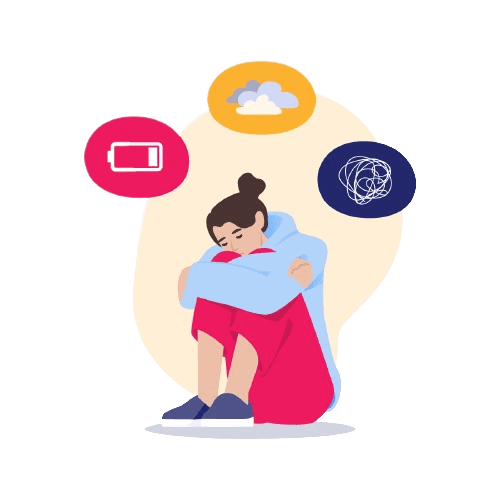Schizophrenia Assessment
3 Min Free Schizophrenia Assessment
What is Schizophrenia?
Schizophrenia is a chronic and severe mental disorder that affects how a person thinks, feels, and behaves. It is characterized by a combination of symptoms that can significantly impact a person’s daily functioning, relationships, and overall quality of life. Schizophrenia is a complex condition with a range of symptoms that may vary from person to person.
The exact cause of schizophrenia is unknown, but it is believed to involve a combination of genetic, environmental, and neurochemical factors. It usually emerges in late adolescence or early adulthood and can be a lifelong condition.

Symptoms of Schizophrenia
The symptoms of depression can vary from person to person, but they often include:
- Delusions
- Hallucinations
- Disorganized Thinking
- Disorganized Behavior
- Negative Emotions
- Cognitive Impairment
- Social Withdrawal
- Apathy
- Emotional Dysregulation
- Lack of Insight
- Catatonia
- Impaired Occupational & Social Functioning

Who Can Benefit From This Schizophrenia Assessment?
The Schizophrenia Assessment can benefit individuals who suspect they may be experiencing symptoms associated with schizophrenia or individuals who have concerns about their mental health. It can also be valuable for family members, friends, or caregivers who want to understand the potential signs of schizophrenia and its impact on their loved ones.
Mental health professionals, such as psychiatrists or psychologists, can utilize the assessment to evaluate and diagnose individuals who may be experiencing symptoms of schizophrenia. The assessment can serve as a starting point for further evaluation, treatment planning, and accessing appropriate interventions and support services. Early detection and intervention are crucial in managing schizophrenia, so seeking professional help is recommended for accurate assessment and guidance.
Types of Schizophrenia Assessment
Brief Psychiatric Rating Scale (BPRS)
The BPRS is a clinician-rated scale that assesses the severity of psychiatric symptoms across different domains, including schizophrenia. It covers various symptom areas such as thought disturbances, anxiety, depression, and hallucinations.
Diagnostic and Statistical Manual of Mental Disorders (DSM)
The DSM is a diagnostic tool used by mental health professionals to classify and diagnose mental disorders, including schizophrenia. It provides criteria that help guide the assessment and diagnosis process.
Neuropsychological Testing
These assessments evaluate cognitive functioning, memory, attention, and executive functioning, which can provide insights into cognitive impairments associated with schizophrenia.
Scale for the Assessment of Positive Symptoms (SAPS) and Scale for the Assessment of Negative Symptoms (SANS):
These are two separate scales used to assess positive and negative symptoms, respectively, in individuals with schizophrenia. They provide a detailed evaluation of symptom severity and help guide treatment planning.
Clinical Interviews
A comprehensive clinical interview conducted by a mental health professional is an essential component of assessing schizophrenia. It involves gathering information about the individual’s symptoms, medical history, family history, and functional impairment.
Positive and Negative Syndrome Scale (PANSS)
The PANSS is a widely used clinical assessment tool specifically designed to measure symptoms associated with schizophrenia. It evaluates both positive symptoms (such as hallucinations and delusions) and negative symptoms (such as reduced emotional expression and social withdrawal).
Treating Schizophrenia
Treating schizophrenia typically involves a combination of medication, psychotherapy, and psychosocial interventions. The primary goal is to reduce symptoms, improve overall functioning, and enhance quality of life. Here are common approaches to treating schizophrenia:
- Psychotherapy: Psychotherapy, such as cognitive-behavioral therapy (CBT) or supportive therapy, can help individuals with schizophrenia manage symptoms, cope with stress, and improve their overall functioning. CBT may also focus on addressing delusional beliefs and challenging distorted thinking patterns.
- Psychosocial Interventions: Psychosocial interventions aim to improve social and occupational functioning and promote overall well-being. These may include family therapy, vocational rehabilitation, social skills training, and supported employment programs.
- Self-Help and Support Groups: Participating in self-help groups or support networks, such as those offered by mental health organizations, can provide individuals with schizophrenia a supportive community where they can share experiences, learn coping strategies, and receive encouragement.
- Education and Psychoeducation: Educating individuals with schizophrenia and their families about the nature of the illness, treatment options, and coping strategies can help them better understand the condition and actively participate in their own recovery.
- Coordinated Specialty Care: Coordinated specialty care programs involve a multidisciplinary team providing comprehensive and individualized treatment. This approach combines medication management, psychotherapy, case management, and peer support to address various aspects of the individual’s life.
- Hospitalization and Crisis Intervention: In severe cases or during acute episodes, hospitalization may be necessary to ensure the safety and stabilization of the individual. Crisis intervention services are also available to provide immediate support during times of crisis.
It is crucial for individuals with schizophrenia to have ongoing support from mental health professionals, a strong social support network, and consistent treatment. Early detection, adherence to treatment plans, and regular follow-up with healthcare providers are important for managing symptoms and promoting recovery. Treatment approaches should be tailored to the individual’s unique needs, and a collaborative approach involving the individual, their family, and healthcare professionals is vital for effective management of schizophrenia.

